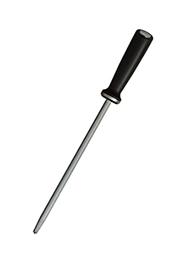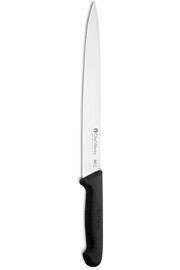

Whether you are an amateur or professional chef, you probably know that chopping and dicing is one of the most important tasks when it comes to cooking. How to get the job done may be up for debate in some circles, but most professionals agree that good knives are the key to impressive cooking skills.
Read on to learn why such a simple tool is so important, as well as how to choose, store, and care for your knives.
Why Cutlery is The Most Important Tool in Your Kitchen
In an age where gadgets and technology abound, you may think you will be better served by a fancy chopper, garlic press, or other special tools to chop and process various foods. While some tools will make a large job go faster, you’ll find that nothing is quite as reliable as a good, sharp knife.
A knife that is properly taken care of doesn’t take up much space, it doesn’t require electricity, and it doesn’t have the tiny crevices that a special tool might have. It requires no pieces or parts, and can do multiple jobs without the need to store several tools to cover a wide variety of tasks.
Combined with good skills, you’ll find that a knife is your most valuable small tool for working efficiently in the kitchen.
Buying the Right Knives
Before you run out and buy a knife, it’s important to understand what you’re going to be doing with it, and exactly what you need.
You’ll want to start with two knives for the basics: A good quality chef’s knife, and a pairing knife. These will get most of your prep work done, and what you’ll use for most vegetable chopping, peeling, dicing, and slicing. You’ll likely use your chef’s knife everyday, so it’s important to get what’s right for you. To do that, you should pay attention to weight and size, and you may even want to practice the motions of chopping. A knife should not be too heavy, or too big, but you don’t want something lightweight either. Chef Works sells a variety of knives in different shapes and sizes, so there is something for everyone.
As far as cost, you don’t need to buy the most expensive knife in the store, but remember that a good knife will last you a lifetime if taken care of properly. Don’t buy something based on price alone; even the most expensive knife on the market is not for everyone. It’s more important to buy something made by a reputable manufacturer that fits your hands and cooking style.
Depending on what other types of cooking you do, you will probably want to invest in more than one type of knife; a baker will need a good serrated knife, while a butcher will likely need a reliable cleaver to cut through bones.
Knife Skills
As important as it is to own the right knife, knowing how to use it is even more important. If you’re a professional chef, you probably already have proper knife skills down pat, but if not, it’s important to learn the basics.
Many cooking stores offer classes that will teach you how to properly use a knife, or you can likely find a tutorial online that will even teach you for free. When learning knife skills, it’s also important that you learn how to properly use a honing steel, which will help keep your knife in tip top shape.
Using a knife improperly can be dangerous, and will almost always lead to injury.
Cleaning Your Knives
One of the best things about a knife over a complicated chopping tool is that it is easy to clean. You don’t have to worry about tiny crevices where food may get stuck, and you don’t have to take it apart to clean it.
While cutlery is very easy to clean, there is one rule that you must follow, and that is to never put your knife in the dishwasher. For one thing, it can easily knock into other dishes causing dings and dents, but prolonged soaking can dull the blades and cause them to rust.
To properly clean your knives, it’s best to rinse them and wash them with hot soapy water immediately after use. Dry it immediately; do not allow it to air dry. Using a honing steel after drying will keep your knife sharp for next time.
Do not put your knives in a sink full of soapy water. Not only is this dangerous if you share the kitchen with someone else, but it’s also a good way to cause the blades to rust.
Caring For Your Investment
Good knives will last a lifetime if taken care of properly, which is why you shouldn’t be alarmed by what seems like a high price for a simple tool.
While caring for them is not difficult, it does require some care to keep them in tip top shape.
If you hone them properly on a regular basis, they should stay sharp for quite a while, but a once a year professional sharpening will really make them work for you. You can buy equipment to sharpen a knife yourself at home, but unless you are sure you know what you are doing, you can very easily ruin a good knife. Almost anywhere that you can buy good cutlery will provide sharpening services; it’s inexpensive, and doesn’t need to be done often.
Proper Storage
Proper storage is a must for keeping your knife in good working order, but also for safety. Never store your knife unsheathed in a drawer full of other utensils; you will almost certainly damage your knife, and probably cut yourself in the process.
Instead, store your knife either in a knife block on the counter or in a drawer or on a magnetic strip on the wall. Either of these protects the blade from dings, as well as prevents you from accidentally cutting yourself while trying to retrieve the knife.
General Knife Safety
Knowing how to use a knife is important to staying safe, as is storing, and caring for your cutlery, but there are some general tips that will also protect you from injury.
First, keep your knives sharp. A dull knife is much more difficult to work with, and is much more likely to slip in your hands, resulting in what could be dangerous cuts. If you drop a knife, do not try to catch it; simply move out of the way and let it fall to the floor. You may ding it, but you will not get injured this way. Finally, remember, that a knife is a dangerous tool that requires constant attention. Do not mindless chop or slice, and be mindful of others when it is in your hands.
Conclusion
Your cutlery is one of your most important tools in the kitchen, and can help you get the job done quickly and efficiently, but it can also be dangerous if not taken seriously. By making sure you get the right knife for you, learning proper skills, and taking proper care of your tools, you can ensure a tool that will never let you down in the kitchen.


